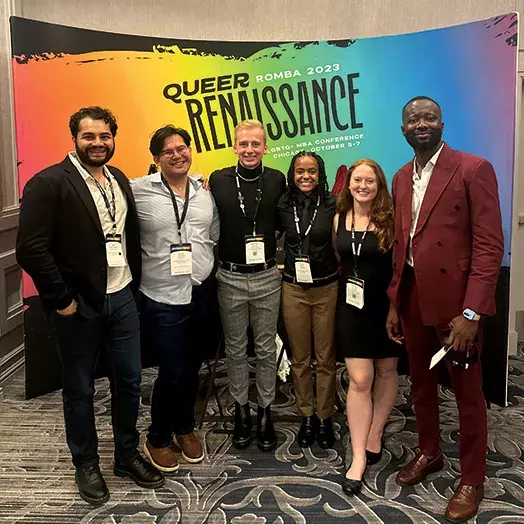Fewer than 10 percent of the nation’s Fortune 500 companies have women at the helm. Carey’s full-time MBA program intentionally supports women primed to lead.

Johns Hopkins Carey Business School is among highest percentages of female full-time MBA students in elite group
Johns Hopkins Carey Business School enrolls the one of the highest percentages of women in a full-time MBA program among the more than four dozen prestigious members of the Forte Foundation. That’s according to that organization and bizwomen.com, a Business Journals online publication.
At Carey, 52 percent of enrolled full-time MBA students are women, and the 2022 cohort is the third in a row to achieve parity.
“It’s hugely important to us that women know not only that they are welcomed to pursue their MBA at Carey, but that they are completely supported here,” said Alex Triantis, dean of Carey Business School. “We are deliberate about it. Women only lead about 9 percent of Fortune 500 companies, and less than 5 percent of the Global 500. That has to improve, and we believe we have to be an active part of improving it.”
One improvement: between women who graduated from the Carey full-time MBA program in 2021 and those who graduated in 2022, base salaries went up an average of 25 percent.
“My time at Carey allowed space for exploration into multiple career paths,” said Kelli Tubman White, who graduated in May 2022 and joined the business and technology consulting firm, Slalom. “The Career Development Office connected me with employers and offered info sessions, workshops, and boot camps. My career coach’s guidance reflected her understanding of my overall interests and how best to navigate a transition into a new industry.”
The full-time program is designed not only to teach the things an MBA candidate needs to know, but the things a female MBA candidate needs to know – like how to make negotiations break their way in a world where they may be viewed differently from male business leaders, or how gender, race, and ethnicity tend to influence perception of leaders and therefore leadership style, for example.
“I’ve been at Carey for 14 years, and one of the things that’s always been true about Carey is that anything is possible,” said Full-Time MBA Program Director Stacey B. Lee. “The women who are attracted to this program want to do something different. They have the drive to take a new program and make it their own. The people who come to us in large part are already leaders. What we do in the time they’re here is teach them how to funnel that passion into achieving what they want to achieve.
“Day One of the program, they do a visualization exercise – where do they want to be in two years? It goes in an envelope. At graduation, they open their envelopes. Nine times out of 10, they make good on that goal.”
Lee says Carey Business School’s distinction doesn’t end with its students. Half the faculty who teach in the program are women, and courses are developed and structured with an intentional lens focused on diversity, equity, inclusion, and belonging.
Carey Business School also offers an array of organized support structures for women. The Women in Business student group fosters meaningful connections and professional support at Carey, in Baltimore, and beyond. The Women’s Alumni Network is dedicated to women leading and developing businesses. The Academy for Women in Leadership is an Executive Education opportunity for research-based, practical learning and personal coaching to maximize impact in business.
In addition to enrolling the second-highest percentage of women full-time MBA candidates among Forte Foundation members, 52 percent of Carey Business School’s total student body are women.
What to Read Next

student experience
MBA students help seek solutions for Native Americans facing end-of-life concernThe Carey Business School full-time MBA is designed with two pathways. The Analytics, Leadership, and Innovation pathway focuses on translating data into insights and solutions in changing markets. The Health, Technology, and Innovation pathway drives at leadership in the business of health, with technology-driven, human-centered solutions to complex challenges in areas like digital health, artificial intelligence in health care and record management, and other related fields. In 2022’s graduating class, 89 percent accepted full-time employment offers within 90 days of graduation.
Over the three years since the program was reimagined, 94 percent of all graduates had full-time jobs within 90 days of graduation. Their average starting salaries have climbed 32 percent since 2020. Three years post-MBA, Carey graduates are doubling their pre-MBA salaries. Five years out, it’s nearly quadruple.
You can learn more about all the programs Carey offers at carey.jhu.edu/programs.


